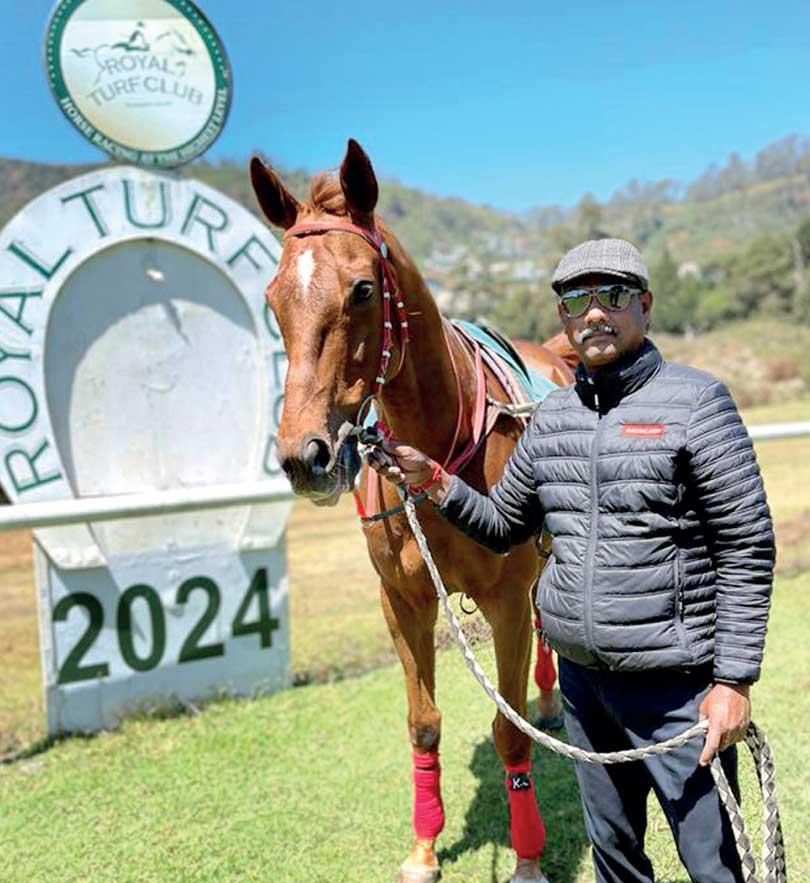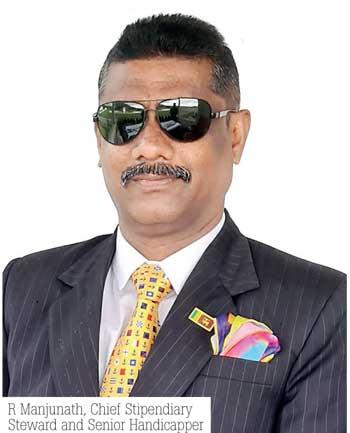25 Mar 2024 - {{hitsCtrl.values.hits}}

“In the racing administration,
we register horses and owners, we license the trainers and jockeys and above all we police and investigate into the integrity of the races. We also investigate into doping of race
horses and overall
we see that the races are maintained with its integrity intact and
no fraudulent practices takes place in the races."
 The Royal Turf Club, the custodian of the Nuwara Eliya Race Track and official conductor of the horse races in Sri Lanka has the services of Mr. R Manjunath as Chief Stipendiary Steward and Senior Handicapper. A widely respected personality in the sphere of horse racing in India, Mr Manjunath has been with the RTC for the last eight years ensuring the RTC Nuwara Eliya races are conducted according to the internationally accepted rule book. With the RTC Nuwara Eliya race season set to start in April 2024 in this exclusive interview Manjunath chats with Daily Mirror Life and explains the potential of horse racing in
The Royal Turf Club, the custodian of the Nuwara Eliya Race Track and official conductor of the horse races in Sri Lanka has the services of Mr. R Manjunath as Chief Stipendiary Steward and Senior Handicapper. A widely respected personality in the sphere of horse racing in India, Mr Manjunath has been with the RTC for the last eight years ensuring the RTC Nuwara Eliya races are conducted according to the internationally accepted rule book. With the RTC Nuwara Eliya race season set to start in April 2024 in this exclusive interview Manjunath chats with Daily Mirror Life and explains the potential of horse racing in
Sri Lanka.
Hailing from Bangalore, India, Mr R Manjunath trained as a mechanical engineer before his love for horses lured him into a career in horse racing. He first got on a horse when he was  only 13 years old and since that time he had an abiding love for all forms of equestrian sports be it flat racing, hurdles racing, dressage or show-jumping. Despite qualifying as a mechanical engineer, Manjunath became a gentleman rider after obtaining a Postgraduate Diploma in Horse Racing Management and Control by the Racing Academy of India. He than moved on to riding in competitions and won flat races, show jumping and dressage events.
only 13 years old and since that time he had an abiding love for all forms of equestrian sports be it flat racing, hurdles racing, dressage or show-jumping. Despite qualifying as a mechanical engineer, Manjunath became a gentleman rider after obtaining a Postgraduate Diploma in Horse Racing Management and Control by the Racing Academy of India. He than moved on to riding in competitions and won flat races, show jumping and dressage events.
In the course of following his passion he had many broken bones but that did not deter him from being involved in equestrian activities.
Manjunath also realised that as he had a sound technical knowledge of horses, he would like to go in to administration of horses like a Stiping or Handicapping administrator. Explaining what a racing administrator does, he says “in the racing administration, we register horses and owners, we license the trainers and jockeys and above all we police and investigate into the integrity of the races. We also investigate into doping of race horses and overall we see that the races are maintained with its integrity intact and no fraudulent practices takes place in the race.”
It is accepted that betting takes place at the races around the world. However in Sri Lanka it is different. While people can bet on international races there is no betting per se at the races in Nuwara Eliya. “ Racing in India is a fully fledged industry. It's a huge revenue generating industry where a lot of people are involved in and a lot of revenue is derived from horseracing.
It's a massive industry generating money not only to the jurisdictional racing authority to sufficiently fund the races, but also in terms of payment of taxes to the government. Comparatively to Sri Lanka, racing is different. During the British time, racing flourished In Sri Lanka. I understand there were three race tracks one in Colombo, in Galle and Nuwara Eliya. Over the period of time 2 race courses have closed down and only the Nuwara Eliya race course maintained by the RTC still stands. Sri Lanka too could follow the Indian model and make horse racing an industry where the government can earn revenue” he suggests.
When the races are held in Nuwara Eliya it helps many industries flourish, especially the hospitality industry as the entire place comes alive with the influx of tourists. From hotels and restaurants to vendors and food stall they all benefit when it is horse racing time in Nuwara Eliya. There is huge potential for horse racing in Sri Lanka, he says, and the Royal Turf Club has recognized this and is working diligently towards making horse racing an income earner not only for the government but also for the various stakeholders in Nuwara Eliya.
One of the most pressing concerns people have regarding horse racing is the cruelty aspect of it. Animal Rights activists often speak about the cruelty to the horses when the jockeys whip them. There is also the concern of pre and post care and welfare of these animals. Addressing this issue, Manjunath explains that with the advent of modern technology developed in Europe, the jockeys now use an Air Cush whip. This whip is filled with air and is not as hurtful, according to him, as the whips used previously. Manjunath also explains that the jockey is not allowed to whip the horse more than eight times during a race. They scrutinize each race via CCTV and any jockey found guilty of excessive whipping is fined a match fee. If they are serial offenders then they are suspended for a number of races and also the use of the whip is barred for the jockeys which acts as a severe deterrent. These deterrents ensure that the jockeys do not abuse the horses during the races, he adds. Additionally Manjunath explained that the Sri Lankan Animal Welfare Association conducts spot checks and looks into the welfare of the race horses often. These steps ensure the race horses are well looked after and are not open to cruelty he concluded.
Addressing the topic of the dearth of Sri Lankan jockeys, Manjunath explained that currently there are only two Sri Lankan jockeys and the RTC is looking to conduct more courses in the hope of attracting more Sri Lankan jockeys. He also said that they have called for applications for female jockeys as they want horse racing to be more inclusive in Sri Lanka.
There are only two racehorse owners currently in Sri Lanka, namely the Edwards and the Jayaratnes in comparison to past years. His view is that this status quo can be changed if foreign investors and sponsors are encouraged to support horse racing. This will then encourage Indian Race Horse Owners to come to Sri Lanka and compete. It is also imperative that the prize money is also increased to make it worth their while, he added. “What racing needs most in this country is more small owners to become involved in multiple ownership of horses. However, for that to happen they will need to be more involved in the sport. This is something the Royal Turf Club Management is aiming for and can only proceed positively if the government can give the racecourse on a long term lease which will see the participation of more stakeholders” said Manjunath.
During the days of the Raj, horse racing in Sri Lanka enjoyed an unprecedented position in society. However with the passage of time and many factors, horse racing takes place only a few times a year. Mr Manjunath, who is currently the Chief Stipendiary Steward cum Senior Handicapper and an expert in his field who is driven by passion for horseracing opines that with the right investment and vision, horse racing in Sri Lanka can reclaim in position as the sport of kings and become a money spinner for not only the government and stakeholders but also for the people of Nuwara Eliya.
Pix courtesy RTC
27 Dec 2024 28 minute ago
27 Dec 2024 58 minute ago
27 Dec 2024 1 hours ago
27 Dec 2024 2 hours ago
27 Dec 2024 2 hours ago